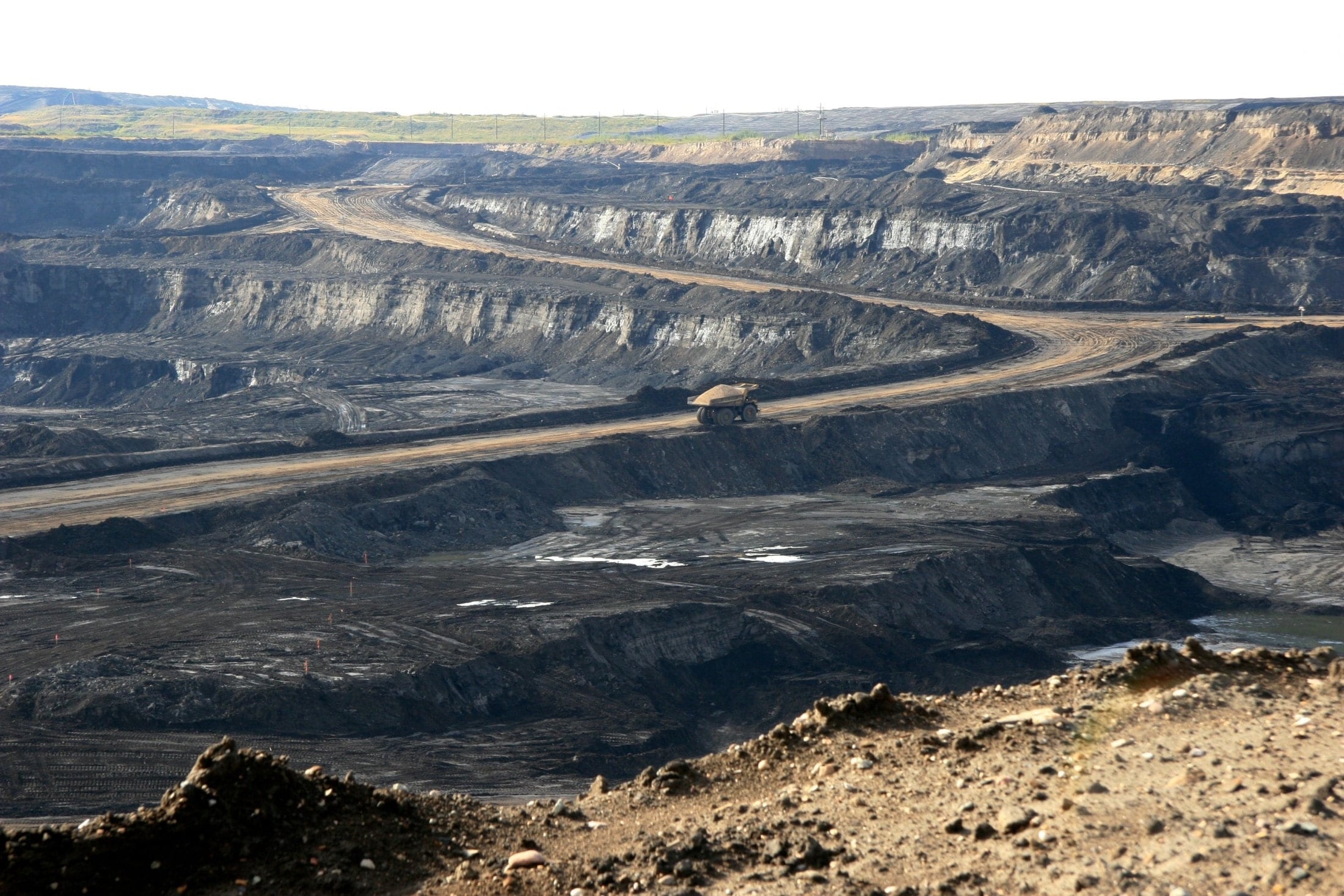Explainer: Why the proposed Frontier oilsands mine is a political hot potato
By Sharon J. Riley, for The Narwhal
The fate of a massive new oilsands project is being seen as the litmus test for the future of the oilsands themselves.
There’s a huge oilsands project that’s getting a lot of attention these days — and it’s not the Trans Mountain pipeline expansion.
A massive new oilsands mine project — widely thought to be the largest Alberta will ever build — is awaiting final federal approval from Prime Minister Justin Trudeau’s cabinet.
The Teck Frontier mine would cover 24,000 hectares — an area twice the size of the City of Vancouver — and would produce 260,000 barrels of bitumen each day at its peak. The proposal includes plans to produce oil starting in 2026, and to continue on producing right through to the 2060s.
Having been under review for several years, the mine’s fate now rests in the hands of the federal government.
And as the February deadline for a final decision approaches, pressure is mounting on all sides of the issue.
Increasingly, the Frontier mine is being seen as a bet on the long-term economic viability of the oilsands themselves.
At the same time, critics say its approval would be in direct opposition to Canada’s climate commitments.
This comes just as a new report out from the Global Gas and Oil Network found that Canada is second only to the United States in planned expansion of the oil and gas industry.
“New oil and gas development in Canada between now and 2050 could unlock an additional 25 [gigatonnes of carbon dioxide], more than doubling cumulative emissions from the sector,” the report found.
Teck would make up nearly 20 per cent of those additional emissions.
We rounded up what the major players are saying about the mine — and it should come as no surprise that opinions are polarized on whether it should move forward.
1. Alberta Premier Jason Kenney thinks it’s essential for the Alberta oil and gas industry
Perhaps unsurprisingly, Alberta Premier Jason Kenney is for the mine. All for it.
He sees its approval as a vote from Ottawa for — or against — Alberta oil.
“If this project does not proceed, it would be a clear indication that there is no way forward for this country’s largest natural resource,” Kenney said this week in a speech in Ottawa.
It “must be done,” he said of the Frontier approval, citing Teck’s estimate that the project will create thousands of jobs.
He also cited the conditional support of Athabasca Chipewyan Chief Allan Adam — who he noted has taken James Cameron, Jane Fonda and Leonardo DiCaprio on tours of the oilsands — for the project. (Buuuut that comes with a caveat, more on that in #5.)
As The Globe and Mail put it this week, Kenney is “pitching Ottawa’s options on Frontier as the environment versus Canadian unity.”
2. Teck Resources isn’t sure it will ever make economic sense to build the mine
Teck Resources previously told The Narwhal it “is committed to advancing Frontier in a socially and environmentally responsible manner” and has projected huge economic returns for Canadian governments at all levels should the project go ahead — to the tune of $70 billion in royalties and taxes.
But the company’s 2018 annual report, released this February, is less confident.
“There is uncertainty that it will be commercially viable to produce any portion of the resources” to be mined at the proposed Frontier site, according to the report.
That raises questions about whether the mine will ever be built, even if it is approved.
3. A review panel recommended the federal government approve the mine, despite ‘significant adverse environmental effects’
The joint federal-provincial panel, comprised of three appointed members, recommended earlier this year that the federal government approve the mine proposal, noting “the Frontier project will provide significant economic benefits for the region, Alberta and Canada.”
The panel cited Teck Resources’ estimates of how much tax and royalty revenue will be generated by the project, and projections for job creation during construction and operation.
The panel also noted “significant adverse environmental effects,” including the removal of 3,000 hectares of old-growth forest, effects on biodiversity, significant impacts on local wildlife species like wood bison, Canada lynx and woodland caribou, and the disturbance of 14,000 hectares of wetlands — including the “irreversible” loss of 3,000 hectares of peatland, a highly sensitive and important carbon sink.
4. The federal Green Party wants the mine rejected because it hampers Canada’s ability to meet its climate commitments
Earlier this week, the federal Green party called on Trudeau and his cabinet to reject the Frontier Mine project.
“Going ahead with construction of the Frontier mine would contribute six megatons of CO2 per year from production alone,” Green Party interim leader Jo-Ann Roberts said in a press release.
“This would seriously compromise our ability to reach the emissions reduction targets set out in the Paris Agreement,” she said.
Canada reaffirmed its target of reducing greenhouse gas emissions by 80 per cent by 2050, compared to 2005 levels, at the Paris climate conference in 2015.
That translates to 150 megatonnes of total emissions nationwide by 2050. The Teck Frontier mine is expected to produce between four and six megatonnes per year, depending on who you ask, which would mean this one oilsands project would eat up three to four per cent of all of the emissions allowed across the entire country in 2050.
Former Green Party leader, Elizabeth May, who is in Madrid for the COP25 summit, echoed Roberts’ call.
“There is absolutely no wiggle room in the global carbon budget for any kind of expansion of oil and gas production,” May said in the press release.
5. A prominent First Nations chief is having second thoughts
Teck has announced that it has secured approval of all 14 local Indigenous groups, but Athabasca Chipewyan Chief Allan Adam recently told CBC he’s not pleased with the steps the company, or the province, have taken to mitigate environment damages associated with the project.
“This would be the first time that the Alberta government is killing its own oilsand project,” he said this week.
“We are not just going to take hot air anymore.”
He’s not alone. Indigenous youth from Canada attending the COP 25 summit in Madrid have also recently expressed concerns over the Frontier mine, which would be just 25 kilometres south of Wood Buffalo National Park.
“This is taking us in the wrong direction,” Eriel Deranger, a member of the Athabasca Chipewyan First Nation and executive director of Indigenous Climate Action, told CBC in Madrid.
6. Economists worry about the long-term viability of the mine
The Frontier mine project is based on higher oil prices than the world is currently seeing — and is premised on the notion that oil prices will increase in the long term.
“Prices are forecast to be US$80 to US$90 per barrel by 2020, and increasing thereafter,” Teck said in a 2016 submission to the review panel. Currently, the West Texas Intermediate (WTI) crude oil price is just below $60 USD per barrel.
In its low-price scenario, Teck assumed an average WTI price $76.51 per barrel and a high-price scenario of $115 per barrel.
Economists say that if the world does take mitigating the climate crisis seriously, that could have an impact on world oil demand — a sizeable impact.
It “would require not only do we not see business-as-usual growth in world oil demand — roughly over one per cent per year — but that we would see anywhere from a 20 to 50 per cent decline in world oil demand over the next 30 to 40 years,” economist Jeff Rubin told The Narwhal last year.
And a reduction in oil demand would reduce oil prices. That, Rubin said, “would shut-in production in places like the oilsands… because their cost of production would no longer be supported by oil prices.”
Gordon Laxer, a political economist and professor emeritus at the University of Alberta, points out that other oil-producing states can produce oil much cheaper than the Alberta oilsands.
“Saudi Arabia produces oil for just a tiny fraction of what Alberta does,” he told The Narwhal last fall. “That oil will have a much longer lifespan than sands oil.”
7. A recently retired Suncor CEO projected last year that new large-scale projects are unlikely to be built in Alberta’s oilsands
Late last year, the province’s latest oilsands development, the Fort Hills Mine, had its grand opening. (Teck has a 23 per cent share in Fort Hills, its first foray into the oilsands. The Frontier mine would be its second.)
At that celebration, Suncor now-retired chief executive Steve Williams predicted a slow future for the oilsands, telling an interviewer that “it’s unlikely there will be projects of this type of scale again.”
8. Canada’s new Minister of Environment and Climate Change, John Wilkinson, is still figuring it all out
Though he’s only a few weeks into his new post as Minister of Environment and Climate Change, John Wilkinson is already facing questions about his government’s upcoming decision on the Frontier mine.
“The issues around greenhouse gases associated with the project are absolutely relevant to the decision that the federal cabinet will need to take,” Wilkinson told The Globe and Mail this week.
“Any decision [cabinet] needs to take will certainly be in the context of the commitments we have made on the climate plan.”
Wilkinson acknowledged that he’s heard Kenney’s calls for the mine to be approved, loud and clear.
“Premier Kenney has made it very clear that the Teck project is important for him, but ultimately we’re going to have to try to find a way to navigate through a decision and project that has a number of challenges,” he told The Globe and Mail.
“I can’t prejudge the decision of the federal cabinet, but what I can tell you is that the issue around the greenhouse gases associated with that project will be very much relevant to the decision that cabinet will take.”
Sharon J. Riley is The Narwhal’s Alberta-based investigative journalist. Her essays, interviews and long-form nonfiction have also been published by The Walrus, Harper’s and the Tyee, among others.

























